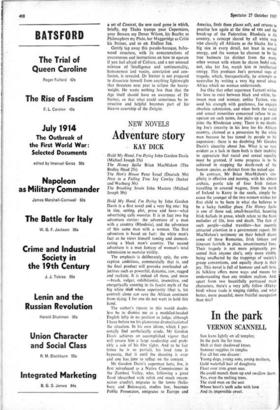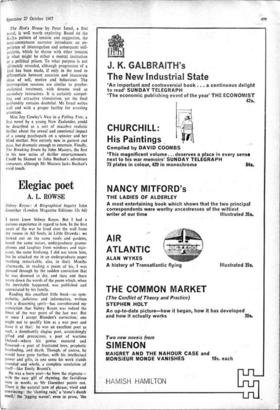NEW NOVELS
Adventure story
KAY DICK
The Honey Spike Brian MacMahon (The Bodley Head 25s) The Hen's House Peter Israel (Deutsch 30s) Nest in a Falling Tree Joy Cowley (Seeker and Warburg 30s)
The Breaking Strain John Masters (Michael Joseph 30s)
Hold My Hand, I'm Dying by John Gordon Davis is a first novel and a very big one: big in size, setting, plot, prose and hero—what advertising calls mansize. It is in fact two big adventure stories : the adventure of a man with a country (Rhodesia), and the adventure of this same man with a woman. The first adventure is based on fact: the white man's fact as he views himself taming and domesti- cating a black man's country. The second adventure is a man fantasy of woman's total submission to mansize virility.
The emphasis is deliberately epic, the con- ception ambitious, commercially that is, and the final product will provoke overloaded ad- jectives such as powerful, dynamic, raw, rugged and realistic. It is indeed all these, and more —brash, vulgar, exhibitionist, insensitive, and energetically cunning in its fascist myth of the big white Mafr whose superiority (that is, his control) alone can save the African continent from dying. I for one do not want to hold this hand.
The author's riposte to this would doubt- less be to dismiss rue as a muddled-headed English lefty in no position to judge, although I have before me his glamorous dramatisation of the situation. In his own idiom, which I per- sonally find aesthetically crude, Mr Gordon Davis achieves an accomplished vigour that will ensure him a large readership and prob- ably a sale of his film rights. And to be fair (since he is so partial), his loud tone is hypnotic, that is until the shouting is over and one has time to reflect on the content.
Mr Gordon Davis's superman hero, Joe, is first introduced as a Native Commissioner in the Zambesi Valley, who, following a great flood (described with relish and much uncon- scious cruelty), migrates to the towns (Salis- bury and Bulawayo), studies law, becomes Public Prosecutor, emigrates to Europe and America, finds these places soft, and returns to practise law again at the time of UDI and the break-up of the Federation. Rhodesia is his country, a concept shared by all white men who classify all Africans as the blacks. Joe is big size in every detail, not least in sexual energy, and the woman he chooses to be his true bedmate (as distinct from the many other women with whom he shares beds) can- not, alas for Joe, match him in intellectual energy. This produces Joe's personal saga of tragedy, which, therapeutically, he attempts to neutralise by writing a very big novel about Africa which no woman understands.
Joe (like that other superman Tarzan) wishes for love to exist between black and white, be- tween man and woman; unlike Tarzan, who used his strength with gentleness, Joe expects absolute submission, and when both the racial and sexual minorities concerned refuse to co- operate on such terms, Joe picks up a gun and joins the Rhodesian army. There is no doubt- ing Joe's sincerity in his love for his African country, claimed as a possession by the white man because he has tamed its people to his expansion : there is no doubting Mr Gordon Davis's sincerity about Joe. What is so very evident as a lack in them both is their inability to appreciate that racial and sexual equality must be granted, if some progress is to be achieved in stopping the death-rush of the human species, as distinct from the naked ape.
In contrast, Mr Brian MacMahon's sim- plicity is effective and moving, with his almost archaic, poetic tale of four Irish tinkers travelling in covered wagons, from the north of Ireland to Kerry in the south, simply be- cause the younger of the two women wishes her first child to be born in what she believes to be a lucky familiar place. The Honey Spike is one of those sad, small-beautiful, haunting Irish ballads in prose, which relate to the basic melodies of life, love and death. The fate of such people—called travellers—has recently attracted attention in a government report. Mr MacMahon's testimony on their behalf draws some of these Romanies, Irish tinkers and itinerant fairfolk in plain, unsentimental lines. Their tragedy is not more poignantly pre- sented than anyone else's, only more visible, being unaffected by the trappings of society's group conventions, and equally sharp is their joy. This novel is full of humour and soft love, its folklore offers more ways and means for understanding than any strident realism. And, apart from two beautifully portrayed main characters, there's a very jolly fellow (Dicky- bird) whose trade is singing riddles, and what better, more peaceful, more fruitful occupation than this? The Hen's House by Peter Israel, a first novel, is well worth exploring. Based on the Kafka pattern of tension and suggestion, the semi-anonymous narrator introduces an ex- perience of interrogation and consequent self- analysis, which he shares with other inmates in what might be either a mental institution or a political prison. To what purpose is not ultimately revealed, although progression of a kind has been made, if only in the need to differentiate between accurate and inaccurate ideas of self, motive and behaviour. The interrogation sessions are similar to psycho- analytical treatment, with dreams used as secondary instructors. It is certainly compel- ling and attractive stimulation, yet the final profundity remains doubtful. Mr. Israel writes well and with a proper facility for arresting attention.
Miss Joy Cowley's Nest in a Falling Tree, a first novel by a young New Zealander, could be described as a sort of macabre realistic thriller about the sexual and emotional impact of a young psychopath on a spinster and her blind mother. Not entirely new in pattern and pace, but dramatic enough to entertain. Finally, The Breaking Strain by John Masters, the first in his new series of thriller entertainments. Could be likened to John Buchan's adventure romances, although Mr Masters lacks Buchan's vivid touch.











































 Previous page
Previous page